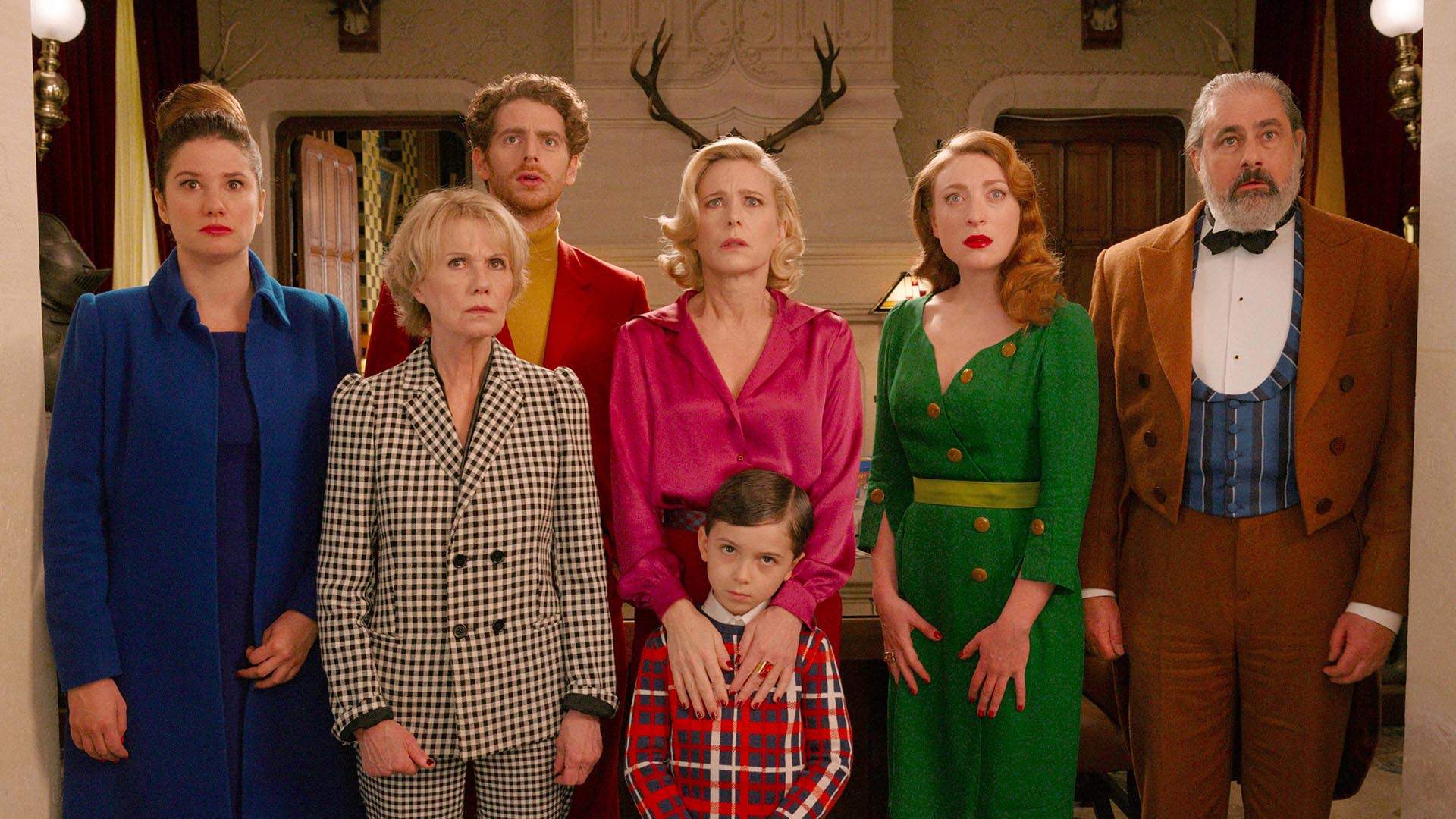Murder Party
If ‘Amelie’ and ‘Knives Out’ combined, the end result would look like this candy-coloured French whodunnit.
Overview
With apologies to William Shakespeare, all the world isn't just a stage in French farce Murder Party. Instead, it's a game, then another one, then yet another after that. This candy-coloured murder-mystery takes perhaps the ultimate high-concept setup and hones in on a crucial fact: that audiences love whodunnits, whether they're watching them on the screen or reading them on the page, because charting the unravelling details entails sleuthing along. In other words, when we're wondering who killed who in which room and why (and with what weapon), we're playing. The board game Cluedo also nailed this truth, as have murder-mystery parties, plus the increasing array of other interactive shows and events that thrust paying participants into the middle of such puzzle-laden predicaments. And while Murder Party acknowledges this idea in a variety of manners, here's the first and simplest: it's set among a family famed for making best-selling board games themselves.
First-time feature writer/director Nicolas Pleskof and his co-scribe Elsa Marpeau (Prof T) kickstart the film with a killer setup: that eccentric crew of relatives, their brightly hued home on a sprawling country estate, an usual task given to a newcomer and, naturally, a sudden passing. Architect Jeanne Chardon-Spitzer (Alice Pol, Labor Day) is asked to pitch a big renovation project to the Daguerre family, transforming their impressive abode so that living there always feels like playing a game (or several). Patriarch César (Eddy Mitchell, The Middleman) already encourages his brood to enjoy their daily existence with that in mind anyway, including dedicating entire days to letting loose and walking, talking and breathing gameplay. But he's looking for a particularly bold next step. He's unimpressed by Jeanne's routine proposal, in fact. Then he drops dead, the property's doors slam shut and a voice over the intercom tells the architect, plus everyone else onsite, to undertake a series of challenges to ascertain the culprit among them — or be murdered themselves.
Also thrust into the high-stakes game, which'll dispense with anyone who refuses to take part or guesses incorrectly: César's son Théo (Pablo Pauly, The French Dispatch), daughter Léna (Sarah Stern, Into the World) and nudgingly named youngest boy Hercule (Adrien Guionnet, Le Bazar de la Charité). Yes, sibling rivalry complicates the hypothesising, as well as the attempts to stay alive. Théo is particularly friendly towards workaholic Jeanne, adding another complexity to the already-chaotic situation. Similarly at hand is the dead man's younger wife Salomé (Pascale Arbillot, Haute Couture) — a mystery writer herself — and his no-nonsense offsider sister Joséphine (Miou-Miou, The Last Mercenary). And, because a home this immense was always going to have some help hovering around, butler Armand (Gustave Kervern, Love Song for Tough Guys) gets drawn in, too.
If Amelie and Knives Out combined, the end result would look like Murder Party. If Wes Anderson and Agatha Christie joined forces, the outcome would be the same. It's highly unlikely that Pleskof was ever going to call his feature Murder in the Game-Filled Mansion or Death While Rolling the Dice, but that's the overwhelming vibe. There's an escape room element, too — thankfully, though, nodding towards the Escape Room franchise isn't on the agenda. Murder Party's characters get stuck in intricately designed locked spaces and forced to piece together clues to secure their freedom, and are only permitted to remain breathing by keeping their wits about them, but no one's in a horror movie here.
There's also a penchant for twists upon twists, including toying with the film's premise. Those zigs and zags are obviously best discovered by watching, but Pleskof and Marpeau know the genre they're diving into — and its tropes, customs and drawcards. They know the kind of flicks they're parodying as well, nodding and winking at everything from Alfred Hitchcock's thrillers to cutesy Gallic comedies. That isn't the same as making the most of their influences, or thoughtfully satirising stereotypical on-screen French quirkiness, however. It doesn't result in a game-changer of a mystery-comedy, either. To Murder Party's misfortune, the small screen has been awash in excellent comic whodunnits in the past year, spanning Only Murders in the Building, The Afterparty and The Resort. If you've seen even just one of those three shows, it'll linger in your mind while watching Jeanne navigate the Daguerre family's mayhem.
Still, there's an enticing air to Murder Party's aesthetic, with production designer Jérémy Duchier (Perfumes), art director Jean-Baptiste Rodet (Agatha Christie's Criminal Games) and costume designer Dorothée Guiraud (Portrait of a Lady on Fire) showering the featuring in a rainbow's worth of shining shades. The film colour-codes its characters just as Cluedo always has — in their outfits, rather than their names — and also turns its vibrantly decorated labyrinth of a mansion into the game-playing version of Willy Wonka's chocolate factory. Visually, Murder Party is exactly what it's meant to be: a sweet treat. And, just like in Roald Dahl's beloved book and the movies that've brought it to the screen, exactly who endures and who gets eliminated is guided by personality, and by riddles and quests that know their players' strengths and weaknesses.
Fluffy, flashy, sugary, elaborate — yes, Murder Party is the dessert of whodunnit flicks in several ways. In-depth characterisations aren't a particular murder-mystery strength (see: the recent versions of Murder on the Orient Express and Death on the Nile), but for everyone except Jeanne, the film remains especially light. There's a reason behind that, linked to the plot's biggest twist of all. Still, in the overall puzzle, that's also too much of a telltale sign. Murder Party wants to ponder the fun and escape of moving tokens, shuffling cards, making guesses and other frivolous trivialities, but getting immersed in the sleuthing, and also invested in each character's fate, proves a slipperier and trickier prospect when it's instantly clear that almost everyone is just a pawn.





